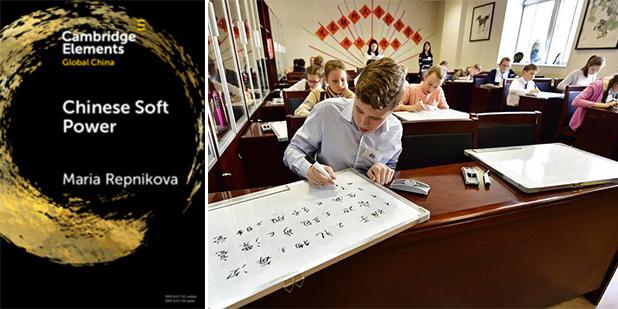Join us for a free one-day workshop for educators at the Japanese American National Museum, hosted by the USC U.S.-China Institute and the National Consortium for Teaching about Asia. This workshop will include a guided tour of the beloved exhibition Common Ground: The Heart of Community, slated to close permanently in January 2025. Following the tour, learn strategies for engaging students in the primary source artifacts, images, and documents found in JANM’s vast collection and discover classroom-ready resources to support teaching and learning about the Japanese American experience.
Chinese Soft Power
Please join the USC U.S.-China Institute for a discussion with Professor Maria Repnikova on China’s complex and often contradictory soft power performance.

Left image: Book cover | Right image: Children working on their chinese characters at a Confucius Institutes, from bbc.com
Chinese Soft Power is the first book in the new Cambridge Elements Global China series. Western media routinely depict China’s soft power efforts as ineffective due to the country’s authoritarian system. In recent years, politicians have called the Confucius Institutes and some other efforts as “sharp power” controls and have sought to restrict them. Rather than definitively proclaim Chinese soft power as either a success or a failure, Maria Repnikova examines China’s complex and often contradictory soft power performance. She shares the official visions for various projects and dissects the how they actually work. Chinese initiatives are at once ambitious and deliberately adaptive to local contexts, and yet they remain contested and perceived with mixed credibility, especially amongst external audiences.
About the Speaker
 Professor Repnikova teaches Communication at Georgia State University where she directed the Center for Global Information Studies. A graduate of Georgetown and Oxford, she has earned numerous fellowships and awards. Chinese Soft Power is her second book and follows her Media Politics in China: Improvising Power Under Authoritarianism. Her articles have appeared in several publications including the International Journal of Press and Politics, China Quarterly, Comparative Politics, and The Journal of Contemporary China.
Professor Repnikova teaches Communication at Georgia State University where she directed the Center for Global Information Studies. A graduate of Georgetown and Oxford, she has earned numerous fellowships and awards. Chinese Soft Power is her second book and follows her Media Politics in China: Improvising Power Under Authoritarianism. Her articles have appeared in several publications including the International Journal of Press and Politics, China Quarterly, Comparative Politics, and The Journal of Contemporary China.
Featured Articles
Please join us for the Grad Mixer! Hosted by USC Annenberg Office of International Affairs, Enjoy food, drink and conversation with fellow students across USC Annenberg. Graduate students from any field are welcome to join, so it is a great opportunity to meet fellow students with IR/foreign policy-related research topics and interests.
RSVP link: https://forms.gle/1zer188RE9dCS6Ho6
Events
Hosted by USC Annenberg Office of International Affairs, enjoy food, drink and conversation with fellow international students.
Join us for an in-person conversation on Thursday, November 7th at 4pm with author David M. Lampton as he discusses his new book, Living U.S.-China Relations: From Cold War to Cold War. The book examines the history of U.S.-China relations across eight U.S. presidential administrations.




